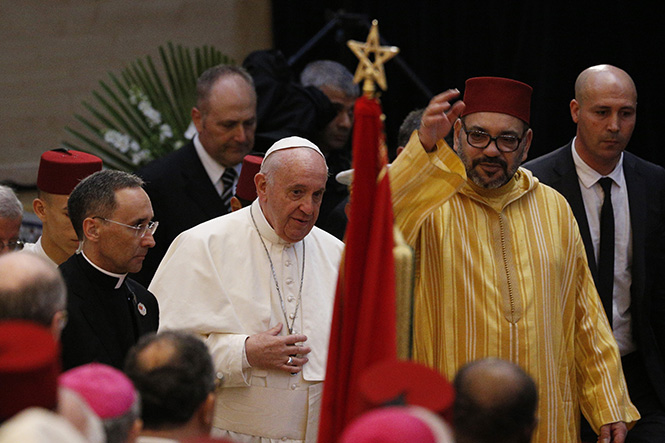
By Inés San Martín
RABAT, Morocco (Crux) — Authentic interreligious dialogue, Pope Francis said Saturday in Morocco, is a way to combat terrorism. It should lead beyond “mere tolerance” of religious minorities, the pope said, who should be treated as full citizens regardless of their number.
“While respecting our differences, faith in God leads us to acknowledge the eminent dignity of each human being, as well as his or her inalienable rights,” Pope Francis said. “We believe that God created human beings equal in rights, duties and dignity, and he calls them to live as brothers and sisters and to spread the values of goodness, love and peace.”
Freedom of conscience and religious freedom, Pope Francis said, which are “not limited to freedom of worship,” are linked to the dignity of the human person.
In a country where 99 percent of the population is Muslim and where locals who convert to Christianity or other faiths face persecution, the leader of 1.3 billion Catholics, a fourth of whom live in places where they’re a minority, said it’s necessary to move past the concept of a religious minority “in favor of citizenship and the recognition of the value of the person, which must have a central place in every legal system.”
Pope Francis also said that fanaticism and extremism must be “countered by solidarity on the part of all believers, grounded in the lofty shared values that inspire our actions.”
The pope’s remarks came during a welcoming ceremony that took place in Rabat’s impressive marble Esplanade of the Hassan Tower, which can host up to 20,000 people. In an attempt to recreate the welcome Pope John Paul II received when he was here in the 1980s, the king and the pope traveled the same road – the pope in the popemobile and King Mohammed VI in a limousine, and they were greeted by thousands.
Along the way and in the esplanade, the two leaders were also greeted by a flourish of umbrellas, as it rained heavily when Pope Francis landed.
The two spoke to the Moroccan people, authorities, representatives of civil society and with the diplomatic corps.
Speaking in Arabic, Spanish, French and English, the king said that the pope’s visit is taking place at a time when the community of nations is “facing a number of challenges,” which includes the “instrumentalization” of God’s message.
“As King of Morocco and Commander of the Faithful, I am the guarantor of the free practice of religion,” he said.
Religion, the king said, cannot be used to justify terrorism: “What all terrorists have in common is not religion, but rather ignorance of religion. Today, religion should no longer be an alibi for ignorant people, for ignorance or for intolerance.”
Morocco, a Sunni Muslim kingdom of 36 million – with just around 40,000 Catholics, mostly immigrants – reformed its religious policies and education to try to limit the spread of fundamentalism in 2004 following a terrorist attack in Casablanca that killed 43 people the year before.
